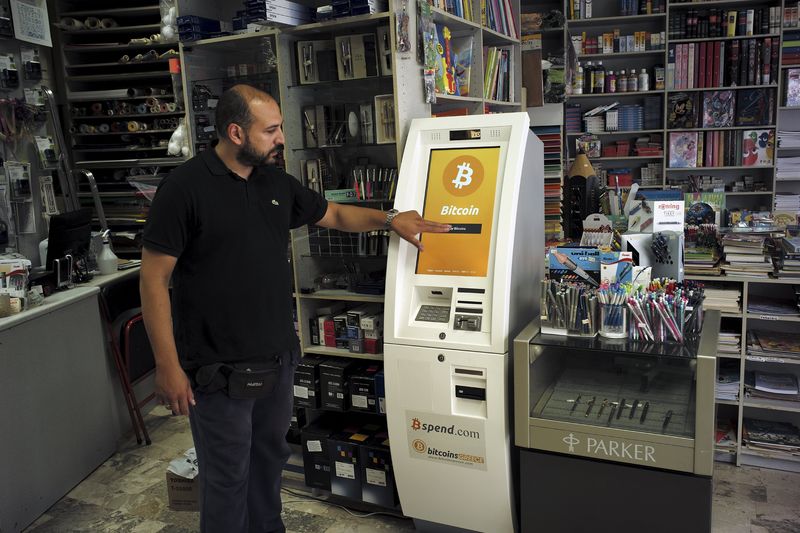By Jemima Kelly
LONDON (Reuters) - There is at least one legal way to get your euros out of Greece these days, to guard against the prospect that they might be devalued into drachmas: convert them into bitcoin.
Although absolute figures are hard to come by, Greek interest has surged in the online "cryptocurrency", which is out of the reach of monetary authorities and can be transferred at the touch of a smartphone screen.
New customers depositing at least 50 euros with BTCGreece, the only Greece-based bitcoin exchange, open only to Greeks, rose by 400 percent between May and June, according to its founder Thanos Marinos, who put the number at "a few thousand". The average deposit quadrupled to around 700 euros.
Using bitcoin could allow Greeks to do one of the things that capital controls were put in place this week to prevent: transfer money out of their bank accounts and, if they wish, out of the country.
"When people are trying to move money out of the country and the state is stopping that from taking place, bitcoin is the only way to move any value," said Adam Vaziri, a board member of the UK Digital Currency Association.
"There aren't any other options unless you buy diamonds, and that's very difficult to move."
But Marinos said the bitcoin buyers' main aim was to shield their money against the prospect that Greece might leave the euro zone and convert all the deposits in Greek banks into a greatly devalued national currency. If voters reject the demands of international creditors in a referendum on Sunday, this becomes much more likely.
"A lot of people are keeping all the bitcoins they buy on our platform, until they understand what to do with them," Marinos said. "In their eyes, now they have bitcoins, they're safe."
VOLATILE CURRENCY
That said, the value of a bitcoin, a web-based digital currency invented six years ago that floats freely and is not backed by a government or central bank, has been highly volatile.
It peaked at over $1,200 in late 2013 before crashing almost 70 percent in less than a month after a hacking attack on the Tokyo-based bitcoin exchange Mt. Gox in early 2014.
This week, as Greece defaulted on a debt to the IMF, the price jumped to a 3-1/2-month high of $268
Most bitcoin-watchers reckon the digital currency's rise is mostly due to speculators betting that capital controls would trigger heavy demand. In March-April 2013, when Cyprus clamped down on bank withdrawals, bitcoin rocketed almost 700 percent.
Coinbase, one of the world's biggest bitcoin wallet providers, which is not currently accessible to Greeks, said it had seen huge interest from Italy, Spain and Portugal.
It said the average daily sign-ups from euro zone countries had increased 350 percent since the start of June. Average daily bitcoin purchases from the euro zone this week were up 250 percent compared with June's average.
On June 20, Greece got its first bitcoin "ATM", in a family-run bookstore in Acharnes on the outskirts of Athens.
There, if they had them, customers could insert euros and in return receive bitcoin at the current exchange rate, which they would scan into an electronic "wallet" on their smartphones.
But with Greeks having to form long queues at bank ATMs just to receive a meager 60 euros' cash a day, this machine has seen no customers since talks with creditors broke down on Saturday.

"Before Saturday, there was some very limited interest, mostly customers asking what it does and how it works," said Maria Varila, an employee in the shop. "Since Saturday, however, when all hell broke loose, there has literally been zero interest."